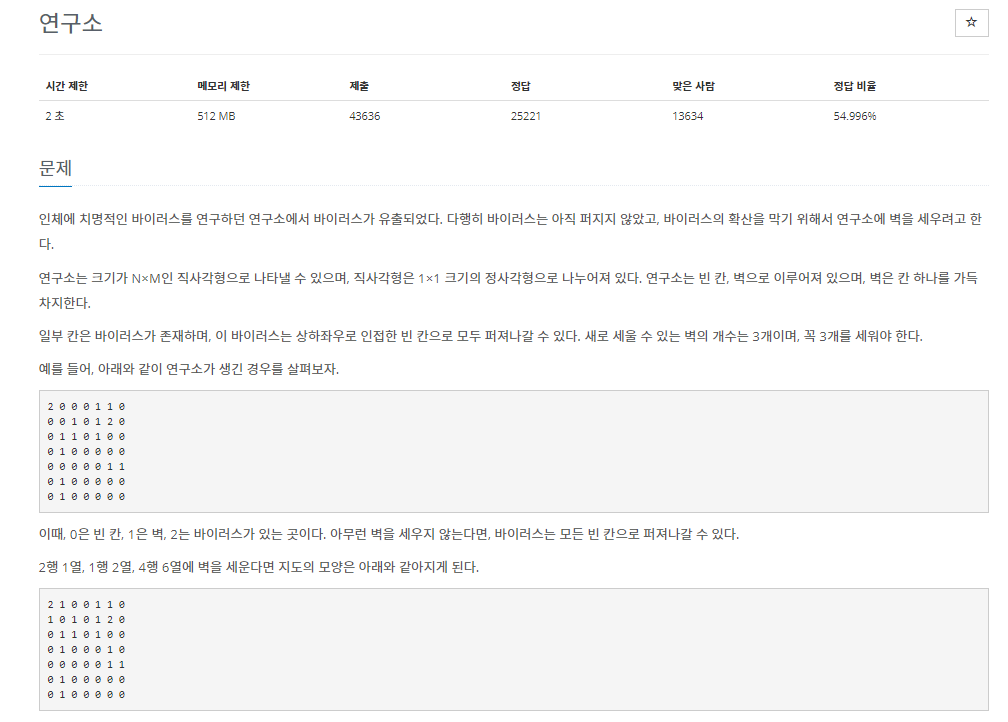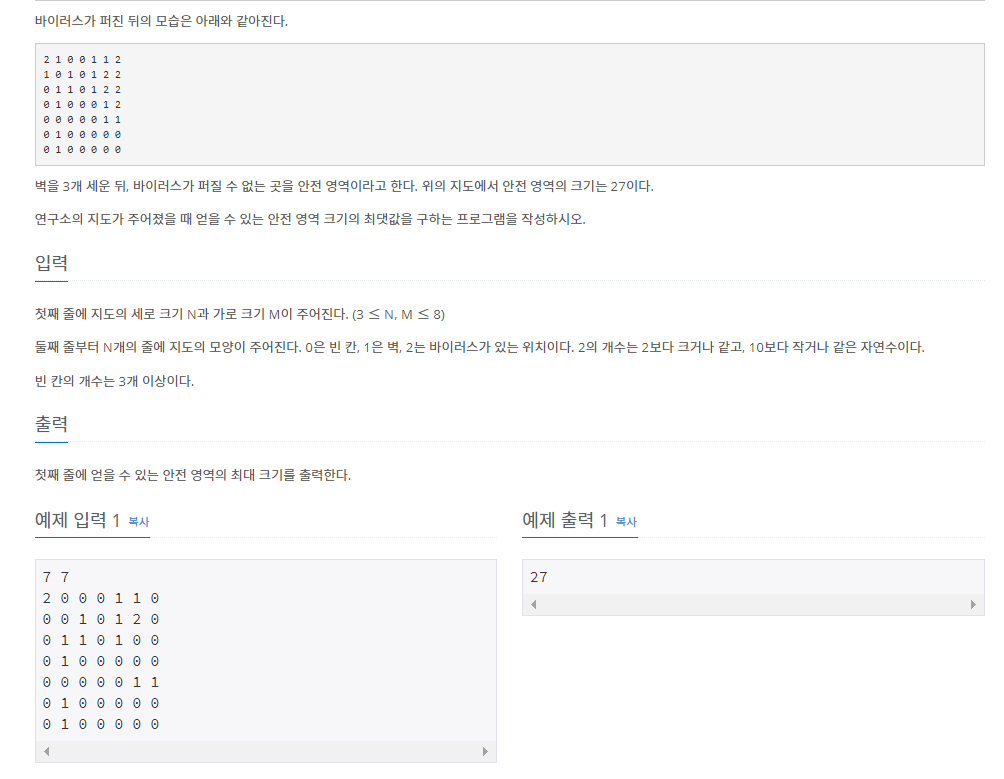백준


1. Python
DFS
n, m = map(int, input().split())
data = []
temp = [[0] * m for _ in range(n)]
for _ in range(n):
data.append(list(map(int, input().split())))
dx = [-1, 0 , 1, 0]
dy = [0, 1, 0, -1]
result = 0
def virus(x, y):
for i in range(4):
nx = x + dx[i]
ny = y + dy[i]
if nx >= 0 and nx < n and ny >= 0 and ny < m:
if temp[nx][ny] == 0:
temp[nx][ny] = 2
virus(nx, ny)
def get_score():
score = 0
for i in range(n):
for j in range(m):
if temp[i][j] == 0:
score += 1
return score
def dfs(count):
global result
if count == 3:
for i in range(n):
for j in range(m):
temp[i][j] = data[i][j]
for i in range(n):
for j in range(m):
if temp[i][j] == 2:
virus(i, j)
result = max(result, get_score())
return
for i in range(n):
for j in range(m):
if data[i][j] == 0:
data[i][j] = 1
count += 1
dfs(count)
data[i][j] = 0
count -= 1
dfs(0)
print(result)
BFS, combinations
import sys, copy
import itertools
from collections import deque
def bfs():
q = deque(virus)
visited = [[0] * M for _ in range(N)]
while q:
row, col = q.popleft()
if row - 1 >= 0 and temp_arr[row - 1][col] == 0 and visited[row - 1][col] == 0:
visited[row - 1][col] = 1
temp_arr[row - 1][col] = 2
q.append([row - 1, col])
if row + 1 < N and temp_arr[row + 1][col] == 0 and visited[row + 1][col] == 0:
visited[row + 1][col] = 1
temp_arr[row + 1][col] = 2
q.append([row + 1, col])
if col - 1 >= 0 and temp_arr[row][col - 1] == 0 and visited[row][col - 1] == 0:
visited[row][col - 1] = 1
temp_arr[row][col - 1] = 2
q.append([row, col - 1])
if col + 1 < M and temp_arr[row][col + 1] == 0 and visited[row][col + 1] == 0:
visited[row][col + 1] = 1
temp_arr[row][col + 1] = 2
q.append([row, col + 1])
if __name__ == "__main__":
N, M = map(int, input().split())
arr = [list(map(int, sys.stdin.readline().split())) for _ in range(N)]
virus = []
temp = []
for i in range(N):
for j in range(M):
if arr[i][j] == 0:
temp.append([i, j])
elif arr[i][j] == 2:
virus.append([i, j])
result = list(itertools.combinations(temp, 3))
min_area = -1
for k in range(len(result)):
temp_arr = copy.deepcopy(arr)
for i in range(3):
temp_arr[result[k][i][0]][result[k][i][1]] = 1
bfs()
cnt = 0
for i in range(N):
for j in range(M):
if temp_arr[i][j] == 0:
cnt += 1
min_area = max(min_area, cnt)
print(min_area)
BFS
import sys
import copy
from collections import deque
dx = [1, -1, 0, 0]
dy = [0, 0, 1, -1]
ans = 0
def bfs():
global ans
w = copy.deepcopy(a)
for i in range(n):
for j in range(m):
if w[i][j] == 2:
q.append([i, j])
while q:
x, y = q.popleft()
for i in range(4):
nx = x + dx[i]
ny = y + dy[i]
if 0 <= nx < n and 0 <= ny < m:
if w[nx][ny] == 0:
w[nx][ny] = 2
q.append([nx, ny])
cnt = 0
for i in w:
cnt += i.count(0)
ans = max(ans, cnt)
def wall(x):
if x == 3:
bfs()
return
for i in range(n):
for j in range(m):
if a[i][j] == 0:
a[i][j] = 1
wall(x+1)
a[i][j] = 0
n, m = map(int, sys.stdin.readline().split())
a = [list(map(int, sys.stdin.readline().split())) for _ in range(n)]
q = deque()
wall(0)
print(ans)



